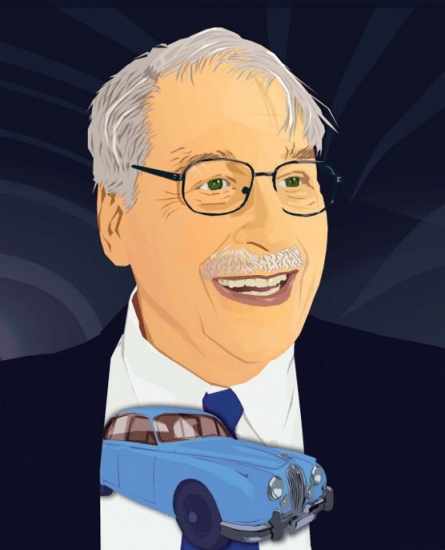
Joe Morgenstern, illustration by Daniel Morgenstein
We immigrated to Israel in August 1963. Tel Aviv reminded me of New York when I was a child. There was a naiveté about it, not at all as that of a city of 300,000. It was most evident when the mother of our babysitter called to say that her son was embarrassed to be walked home at 1 am or later. It was a city without crime. Policemen who were more peacemakers than peace enforcers mostly solved spats between neighbors.
We purchased our home in a nine-story house and discovered that it was the tallest building in the city. Air conditioning was nonexistent and at night we were often kept awake by the noise of animals from the nearby zoo, which was a major attraction for the city's children. Transportation was closed on Shabbat, yet it seemed that the city's total population was at the seashore. It was reminiscent of New York's Coney Island.
Our favorite night time entertainment was a movie and then a visit to the Bezalel market, just off Allenby Street, for a falafel. An evening out used to cost about $2. Nearby was the Yemenite quarter which had the best restaurants in the city. Hummus, shashlik, kebabs, snia and ox balls were the delicatessen of the day. What made Yemenite food attractive was that Yemenites did not suffer from heart attacks. The meat they ate was without fat. Prices continued to be attractive in the 1960s as $3-$5 was a price of a full meal.
The Habimah Theater was Tel Aviv's cultural center. It was the first Hebrew language theater and we remember seeing Faust. The Mann Auditorium had celebrated its 10th anniversary in the 1960s. The Israel Philharmonic was acquiring a worldwide reputation as a first rate orchestra. Conductor Zubin Mehta came aboard and the orchestra began to travel all over the world.
Television was nonexistent when we immigrated. Nevertheless, we followed advice and brought a set with us. A peculiarity of the law was that it had to be a second hand set. Due to the electricity being 220 volts instead of the American 110 v. it was not possible to bring a second hand set. However, we were out to beat the customs people and asked the seller to “shmutz up” ourTV to make it look like it was second hand. To our chagrin, when the TV arrived it was sparkling new in an unopened box. Being stubborn, I refused to pay customs. The set was hauled away and was returned a year later in response to our claim that it was now old and second hand. Several years later on Independence Day, we watched an Israeli Air Force fly-past on our "second hand" TV.
In 1965, a local impresario tried to bring The Beatles to Israel for a performance in Tel Aviv. He applied to the Ministry of Culture for a subsidy, which was standard procedure at the time, but the ministry decided not to participate. The incident is remembered as a case of Israel banning The Beatles, which is not exactly true. The ministry simply decided not to provide the usual subsidies. Because The Beatles' music was seen as a break with the halutzic, pioneering tradition – which it was. But Israeli culture was changing anyway. There was a new rhythm and a new style coming in. It was very much a generational change. The founding generation disliked it and tried to resist it.
The tale of Tel Aviv begins in the time of Bible stories and legends. It was on the shores of Jaffa that the whale spat up Jonah. And at the spot where Andromeda's rock stands, Andromeda, of Greek mythology, was kept captive until Perseus came on his winged horse to rescue her. At 4,000 years old, Jaffa is the oldest port in the world. Built during King Solomon's time, the materials used for making the Temple in Jerusalem were shipped in through this harbor.
In 1468 BCE the Israelites lost the port to the Egyptians. However, Jewish sages and scholars remained in the area up to the thirteenth century, when the Mamaluks killed the city's inhabitants.
In 1909, sixty families bought a plot of land stretching from Neve Tzedek to the banks of the Yarkon River, some six miles away. The land consisted of sand dunes overlooking the Mediterranean. The families called their new town 'Housing Project'. However, after a year they renamed it Tel Aviv, which means 'Spring Hill'. The first modern Jewish town had been born. Its first mayor was Meir Dizengoff, from 1910 to 1937. Today he has a street, a fountain and a shopping mall named after him.
By 1926 Tel Aviv's population had swollen to 40,000 residents and the first town hall had been built. By the 1930s, it was home to over 100,000 inhabitants.
Many of those who arrived in the 1930s were German intellectuals who were escaping from Nazism. Among them were architects who had been influenced by the Bauhaus school of architecture. They were responsible for the look of early Tel Aviv. Along roads such as Rothschild, Bialik and Allenby there are over 3,000 buildings built in the Bauhaus style.
Throughout the war years Tel Aviv was a center for Zionist resistance against Britain's anti-immigration policy. Shiploads of Jewish refugees fleeing from Nazi occupation were refused entry. Along the beach there are many plaques marking places where immigrants were either successfully smuggled in or where the British opened fire on the boat. The Haganah Museum, the Etzel Museum and the Jabotinsky Institute detail the story of the resistance fighters' struggle against British authority.
The 1950s saw the building of the Mann Auditorium to house the Israeli Philharmonic Orchestra, and the founding of Tel Aviv University. By the mid-1960s Tel Aviv had a population of 400,000, many of whom were Jewish immigrants.
Back in the 1960s my friends said I was insane when I announced my intention of importing a Jaguar to Israel. "True, you will have an unusual car, but if anything goes wrong, you won't be able to get parts or find a mechanic qualified to install them."
Undaunted, I ordered my Jaguar. It was to be a beauty with metallic silver paint and red leather upholstery.
The fun began almost at once, as new import duties were tabled and a deadline for the arrival of the car was decided by the Treasury. The upshot of it all was that someone else took possession of my silver beauty and I got a model which arrived three days before the deadline. "Anyhow, what is wrong with a blue car with grey upholstery," I consoled myself.
The car was nicknamed “the sexy beast”. Its sleek lines, luxurious interior appointments, its airplane like control panel with more dials and controls than a jet fighter gave me the feeling of being a king of the road.
It was two years before some minor problems arose and the local agent had no spares. I was furious and wrote to the Jaguar people in England. They took me seriously and fired the dealer but did not bother to appoint a new one.
The solution to the parts problem came in the form of my mother-in-law who lived in London. She bought the parts from the Jaguar people and gave them to one of her friends who traveled to Israel.
In 1968 I allowed the Jaguar to be drafted into the Israeli army. The army needed people with cars who would deliver call up notices. I presented my car to the Israeli Defense Forces with the one ultimatum, namely, that I drive it. The army was enchanted with my offer. And so the Jaguar was part of Israel's army and I became its chauffeur. A year later I came to the army with another proposition. Return the Jaguar to civilian status and take me instead. And so it was that they agreed. It was the beginning of a 17-year career as a reservist.
When the Yom Kippur War broke out I was in Jerusalem with my sons and a friend. We drove back to Tel Aviv and as expected, the callup notice was plastered on the door. My wife said, “take the car with you,” and so the Jaguar and I set off for the appointed meeting place. The Jaguar became a legend. I once met a pilot who said: “Don't you remember me? You picked me up in your Jaguar when we were returning to our units.” Just before the final signing of the cease-fire, together with three other reservists, we drove to the Suez Canal and witnessed the awful scenes of a defense line gone wrong. On the way back we were nearly out of gasoline when I spotted a United Nations army camp. With all of the chutzpa acquired in Israel I drove to the gate, and when accosted by a soldier I told him that I wanted to buy some gasoline. They brought us a jerrycan of benzine and would not take any money. My army buddies watched with awe as I solved our problem. I had some brandy in the back of the car and some good Cuban cigars. The soldier was delighted with both.
My army stint included visits to Nabatiya in southern Lebanon and Beirut. These experiences formed a number of war columns that appeared in The Jerusalem Post, and other publications.
Getting work was a Herculean task. It was amazing how many individuals told me how suited I was for the job but also they were sure that in six months I would be back in the States. A seminal event was my interview with Benjamin Mayer. The three Mayer brothers carved out an empire that ranged from real estate and banking to industry. I was invited to Mayer's office at 6 Rothschild street in Tel Aviv. He was dressed in a suit and sat at a desk with a magnificent floor to ceiling window in back of the desk. We went through the routine of an interview. Like others, he admitted that I seemed to have the abilities needed for the job. Something snapped in my head. I asked him to get up from his desk and look out through the window. “In three minutes I will be leaving the building and will start to cross the boulevard. Mr. Mayer, I really don't know whether I will reach the other side but you seem to know what I will be doing in six months,” I stated. I turned around, about to leave the office when I heard what I had waited to hear. "Mr. Morgenstern, can you start on Sunday?” It was the beginning of a lifelong friendship.
Years later, a professor from Buffalo University contacted me. She was doing an oral history. Its subjects were Americans who immigrated to Israel in the 1960s. After an hour-and-half interview she looked at me and said that it was a most unusual interview. I asked her why and she said that of the twelve individuals interviewed I was the only one who was happy with his life in Israel.
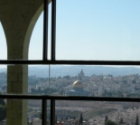 The Morman University Sunday Concert, with ESRA
The Morman University Sunday Concert, with ESRA 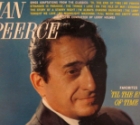 Congratulations to ESRA Rehovot on its 10th
Congratulations to ESRA Rehovot on its 10th 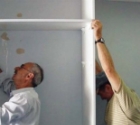 THANK YOU!
THANK YOU! A new website in English - on Volunteering - Launched in Israel
A new website in English - on Volunteering - Launched in Israel Help Needed for Abused Horses and Donkeys
Help Needed for Abused Horses and Donkeys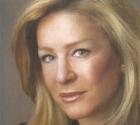 Heather's Heseg
Heather's Heseg Joseph (Joe) Morgenstern
Joseph (Joe) Morgenstern